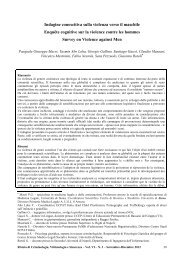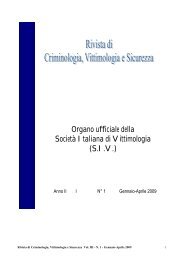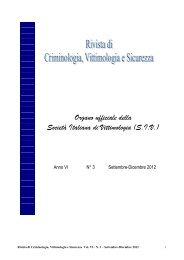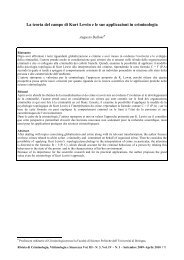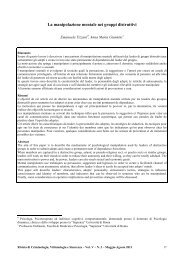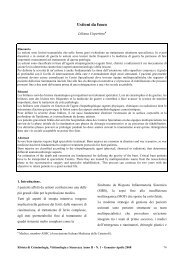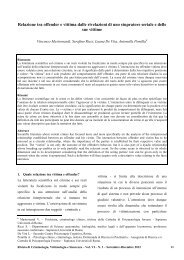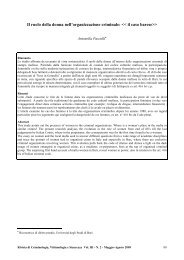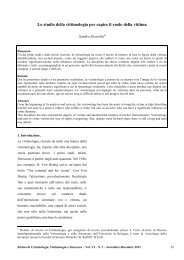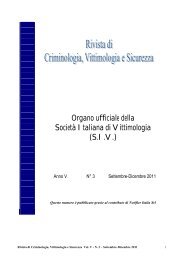Globalization, Transnational Crime and State Power ... - Vittimologia
Globalization, Transnational Crime and State Power ... - Vittimologia
Globalization, Transnational Crime and State Power ... - Vittimologia
Create successful ePaper yourself
Turn your PDF publications into a flip-book with our unique Google optimized e-Paper software.
products, <strong>and</strong> cultures. Even more importantly,<br />
globalization or at least regionalization are also<br />
seen as guaranteeing peace among nations united<br />
<strong>and</strong> interdependent through trade, commerce,<br />
various exchanges, <strong>and</strong> an increasing web of<br />
interpersonal relations made possible, as in the<br />
EU, by the free movement of people, goods,<br />
capital <strong>and</strong> services. 17<br />
<strong>Globalization</strong> <strong>and</strong> the growth of international<br />
commerce, the exporting of jobs from more<br />
developed regions of the world to underdeveloped<br />
ones, thus creating employment <strong>and</strong> revenue, the<br />
remittances of emigrants that sustain their<br />
families, relatives, <strong>and</strong> at times literally their<br />
countries back home, the advances in farming,<br />
production of crops <strong>and</strong> food, medicine <strong>and</strong><br />
surgery, the growing investment in developing<br />
countries, the dizzying speed of today’s<br />
communications, information <strong>and</strong> economic<br />
transactions <strong>and</strong> many other phenomena affecting<br />
our daily lives <strong>and</strong> made possible by globalization<br />
have vastly improved the way in which most of us<br />
live our lives, even though major inequalities still<br />
exist between different parts of the world. 18<br />
National in Global <strong>Crime</strong>s”, Berkeley J. Int'l L., 2004.<br />
See also Rotman, supra, note 5.<br />
17 See I. Clark, “<strong>Globalization</strong> <strong>and</strong> Fragmentation:<br />
International Relations in the Twentieth Century”, 17,<br />
1997 ("There is pervasive resort to the twin themes of<br />
globalization <strong>and</strong> fragmentation in a wide variety of<br />
literature."); Boutros-Boutros Ghali [sic], 50th<br />
Anniversary of the United Nations, Vital Speeches,<br />
Nov. 15, 1995, at 66 (stating that globalization <strong>and</strong><br />
fragmentation are the two great forces that will shape<br />
the world in the 21st century).<br />
18 For more information on this related to health, see<br />
generally, G. J. Annas, “Human Rights <strong>and</strong> Health -<br />
The Universal Declaration of Human Rights at 50”,<br />
New Engl<strong>and</strong> J. Med., 339, 1998, p.1778, pp. 1780-81.<br />
On globalization in general <strong>and</strong> its effect on the law,<br />
see generally R. Falk, Predatory <strong>Globalization</strong>: A<br />
Critique (1999); P. J. Spiro, “<strong>Globalization</strong>,<br />
International Law, <strong>and</strong> the Academy”, N. Y.U. J. Int’l<br />
L. & Pol., 32, 2000, p. 567; B. Stern, “How to Regulate<br />
Poverty is, after all, a relative concept. For<br />
example, in less than 50 years, countries that were<br />
net exporters of people through emigration are<br />
now the coveted destination of legal <strong>and</strong><br />
undocumented immigrants from other parts of the<br />
world, just as countries that were until recently<br />
welcoming jobs outsourced by richer countries<br />
where labor was more expensive, are now<br />
themselves already beginning to export jobs to<br />
still poorer parts of the world <strong>and</strong> even back to<br />
richer ones.<br />
B. The negatives in globalization.<br />
But unfortunately not all consequences of<br />
globalization are positive. <strong>Globalization</strong> can be<br />
seen in the advancement of technology, as well as<br />
in the global expansion of trade. But these<br />
developments that are expected to help us achieve<br />
prosperity, freedom, <strong>and</strong> peace, can also produce<br />
social fragmentation, economic dislocations <strong>and</strong><br />
exacerbate critical vulnerabilities, opening the<br />
door to violence <strong>and</strong> conflict. The more negative<br />
aspects of globalization are often attributed to<br />
capitalism <strong>and</strong> labeled as “McDonaldization” <strong>and</strong><br />
“Americanization” 19 . Threats have become global<br />
in scope ironically in great part because of the<br />
achievements of increased <strong>and</strong> more diffused<br />
knowledge, powerful <strong>and</strong> readily available<br />
technologies, <strong>and</strong> the apparently uncontrollable<br />
mass movements of people. Ironically, the<br />
advances <strong>and</strong> the improvements in the conditions<br />
of daily life for millions of people, especially the<br />
increasing wealth across the world (relatively<br />
speaking), also have the potential of creating <strong>and</strong><br />
fostering negative consequences favorable to the<br />
<strong>Globalization</strong>?”, in Byers M. (ed.), The Role of Law in<br />
International Politics, 2000, p. 247.<br />
Rivista di Criminologia, <strong>Vittimologia</strong> e Sicurezza Vol. III - N. 3, Vol. IV – N. 1 – Settembre 2009–Aprile 2010 66



